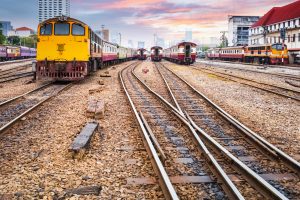China’s foreign minister has called for China and Thailand to expedite the construction of the high-speed railway project connecting the two countries, a project that has seen repeated delays. Speaking to Prime Minister Srettha Thavisin yesterday, at the end of a three-day visit to Bangkok, Wang said that the two nations “should jointly advance high-quality Belt and Road cooperation, speed up the construction of the China-Thailand Railway, and open the central line of the Trans-Asian Railway,” according to a Chinese Foreign Ministry statement quoted by BenarNews.
Wang added that the two nations should also “realize regional connectivity, and promote the early implementation of the vision of interconnected development of China, Laos and Thailand, to provide new impetus and open up new space for the long-term development of the two countries.”
The proposed 873-kilometer rail link will connect Bangkok to the Nong Khai on the border with Laos, where it will connect to the China-Laos Railway, a key project of China’s Belt and Road Initiative (BRI), which began operations in late 2021. When the link is completed, it will be possible to travel by train from Bangkok to Kunming, the capital of China’s Yunnan province.
Since its inception in 2014, however, the rail project has been beset by delays, as Thailand’s bureaucracy has thrown up various obstacles over the design and financing of the route. In December 2017, construction began on the first portion of the line, linking Bangkok and Nakhon Ratchasima, but six years later it is still only around 15 percent complete, despite several promises by former Prime Minister Prayut Chan-o-cha to push the project forward.
Exactly what explains this sluggish progress is hard to say. Some of this comes down to the complex financing and engineering required for such a costly and technologically advanced project. But there have also been suggestions that some Thai officials are reluctant to deepen the country’s economic integration with (and dependence on) southern China, and some have certainly questioned the economic rationale for the project, the cost of which has been estimated to fall somewhere between $5 billion and $9.9 billion. Either way, the slow progress has reportedly been a subject of considerable frustration in Beijing, which tends to view such big-ticket BRI projects as a litmus test of bilateral relations.
In October, shortly after taking office, Srettha pledged to speed up the railway project in support of his economic agenda. “Logistics is one of the significant issues for Thailand regarding BRI cooperation and Thailand will enhance the connection between its domestic railways and the China-Laos Railway, a flagship BRI project in the region,” he said in an interview with the Chinese state media agency Xinhua.
According to the Chinese statement cited by BenarNews, Srettha admitted issues in the compatibility of the Thai line with that in Laos. “This project faces challenges regarding the transshipment of goods,” he reportedly said. “It was agreed that working groups from both countries will collaborate further on resolving these issues.” Neither leader mentioned a time frame for the project’s completion, but according to the Bangkok Post, the Thai government currently expects it to begin operations in 2028.
However, given the delays that have dogged the project so far, and the frequent failed promises from Thai leaders to get the project moving, this seems a tad on the optimistic side – assuming the project gets built at all.
As expected, Wang and his Thai counterpart Parnpree Bahiddha-Nukara yesterday signed a mutual visa waiver agreement allowing Thai and Chinese passport holders visa-free entry for 30 days, effective from March 1. The two countries hope that the move will lead to a revival of tourism between the two nations, which fell sharply at the beginning of the COVID-19 pandemic, and is yet fully to recover.
































